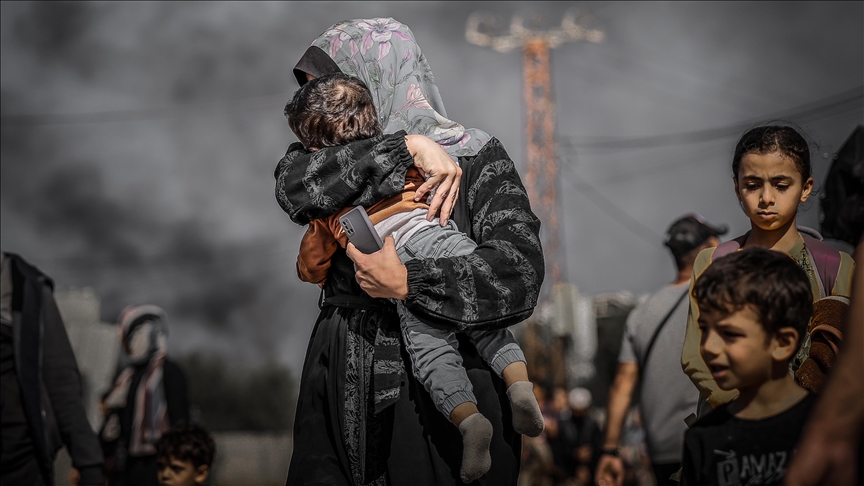Carrying Grief with Grace: The Palestinian Women’s Legacy of Resilience
Today, the women of Palestine stand as living symbols who remind the world what strength truly looks like, not the kind that shouts for attention, but the kind that endures with sabr, faith, and grace. They are wives, mothers, daughters, and sisters who carry wounds and shattered homes while continuing to build, teach, and nurture. They are journalists, health workers, teachers, and front liners, women who, under occupation, have refused to surrender their identity, dignity, or modesty.
Bint-e-Abdullah
10/26/20257 min read


Share your thoughts
In the heart of Palestine, amidst ruins and resistance, walk women who embody what it means to have faith anchored in Allah, not in circumstances.
They have seen their homes crumble, their families scattered, and their skies darkened, yet their hearts remain illuminated with tawakkul (trust in Allah).
They are symbols of strength, dignity, and spiritual clarity.
There is a kind of strength that the world cannot measure, not in muscle, not in noise, not in position.
It is the strength of a woman who buries her husband, wipes her tears, and whispers, “Alhamdulillah” and “Hasbunallahu wa ni'mal wakeel."
It is the strength of the Palestinian women, mothers, wives, and daughters who have seen the world collapse around them and yet never lost their faith, grace, or sense of purpose.
They have taught us that iman is not proven in comfort; it is revealed in the ruins.
When a woman loses her husband, father, or son, the world tells her she is “alone.” But these women know something the world forgets: that Allah is never absent.
“Indeed, we belong to Allah, and indeed, to Him we will return.”
(Surah Al-Baqarah, 2:156)
They repeat this not as words of despair but as a declaration of belonging. Every martyr they lose becomes a light that leads them closer to their Lord. They cry, they grieve, they break, but they do not collapse. Because even in heartbreak, their hearts are anchored to something eternal.
Their trials are not punishments; they are divine promotions, proof that Allah sees greatness in them that the world cannot comprehend.
When the world closes in on them, their hearts turn upward. In their eyes, you see what Allah described in the Qur’an:
“And never think of those who have been killed in the cause of Allah as dead. Rather, they are alive with their Lord, receiving provision.”
(Surah Aal Imran, 3:169)
Every mother who sends her son to the front lines whispers this verse to herself.
Every wife who buries her husband holds to the promise that nothing done for Allah is lost.
These women live by the conviction of the Prophet ﷺ, who said:
“The most severely tested people are the prophets, then those nearest to them, then those nearest to them.”
(Tirmidhi, 2398)
They have accepted that tests are not punishments; they are proofs of purpose.
Love That Lives Beyond the Grave
Many of them were brides only briefly. Their wedding dreams turned into nights of prayer.
Their love stories unfinished here continue in Jannah, where no separation exists.
“And those who believed and whose descendants followed them in faith, We will join them with their descendants, and We will not deprive them of anything of their deeds.”
(Surah At-Tur, 52:21)
This is the promise they hold: that love, when rooted in Allah, never truly dies. They remind us that true companionship is not in selfies and anniversaries, but in duas made in solitude and sacrifices shared for the sake of Allah.
Dignity Amidst Destruction
While the world rushes to define strength through loudness and visibility, the women of Palestine remind us that real power lies in composure and conviction.
Their haya’ (modesty) is not lost to chaos. Even in displacement, starvation, and relentless bombings they cover, they pray, and they nurture. Their grief is deep, but their faith runs deeper. Their homes may fall, but their moral compass never shifts.
This quiet defiance echoes the words of Maryam (AS), who withdrew in solitude and still stood dignified when the world misunderstood her.
“She said, ‘Indeed, I have vowed to the Most Merciful abstention, so I will not speak today to any human being.’”
(Surah Maryam, 19:26)
In Maryam’s silence, there was surrender to Allah, not to people.
In the Palestinian woman’s steadfastness, there is the same surrender, but only to her Lord.
Lessons for Us: The Women of Comfort
Many of us break over words, rejections, delays, or minor injustices. We, who live far from the sound of sirens, bombs, and constant safety and security threats by occupation, frequently break under the weight of minor tests, delays, disappointments, or criticisms.
Yet, the women of Gaza carry unimaginable burdens and still smile with iman lighting their faces.
From them, we learn that faith is not about avoiding pain but transforming it into purpose.
“Do not lose hope, nor be sad. You will surely be victorious if you are true believers.”
(Surah Aal Imran, 3:139)
But the women of Palestine remind us that the essence of womanhood in Islam is not fragility; it is faith-fueled fortitude. When they lose the men they love, they do not lose their identity. They rise as single mothers, caretakers, teachers, and leaders, nurturing the next generation of resistance and faith.
Think of those women Palestinian journalists who became a voice of truth under occupation. They stood firm, reporting from the frontlines with courage and grace, while wearing their press vests.
Think of Um Nidal (Maryam Farhat), the mother known as “The Mother of the Martyrs”, who sent her sons to defend her homeland and still said, “I gave them for the sake of Allah, and I am content with His decree.”
Think of the countless unnamed women nurses treating the wounded, teachers continuing lessons in rubble, and girls memorizing the Qur’an by candlelight.
Their resilience reflects the women of the earliest days of Islam:
Sumayyah bint Khayyat (RA): the first martyr of Islam, who stood unshaken against tyranny.
Umm Salamah (RA), who migrated alone after being separated from her husband and child, yet became one of the most influential narrators of Hadith.
Khawlah bint al-Azwar (RA), who led armies with strength and honor after losing her brother in battle.
And today, their spirit continues in the women of Gaza: nurses, journalists, aid workers, and mothers who turn their pain into power. They do not protest their fate; they prostrate through it.
“So be patient. Indeed, the promise of Allah is truth.”
(Surah Ar-Rum, 30:60)
They are the continuation of a legacy that began with Asma bint Abu Bakr (RA) carrying food to the Prophet ﷺ in the cave, Nusaybah bint Ka’ab (RA) defending him at Uhud, and Khawlah bint al-Azwar (RA) leading armies in defense of truth.
Palestinian women today are their reflection, modern heirs of a timeless courage rooted in faith.
Their resistance is not only in standing against occupation, it is in continuing to live, nurture, teach, and love under it. It is in the mother’s lullaby whispered under rubble. In the nurse who wipes blood from her patient’s face and says, “Inna lillahi wa inna ilayhi raji’un.”
They resist with pens, with prayers, with patience. They remind us that resistance does not always roar; sometimes, it breathes through gentleness, through discipline, and through the refusal to let pain make us bitter. Their lives ask us a question:
If they can remain grateful under bombs, how can we remain restless over comfort?
If they can guard their deen under oppression, how can we let convenience weaken ours?
Let us learn from them not merely to weep for the Ummah but to walk with intention, to serve our families, to speak truth with humility, and to preserve our haya’ as a shield, not a limitation.
Because in their story lies our reminder that modesty is not weakness, resilience is not rage, and faith is not fragility. We live in a time where even small discomforts make us question Allah. Yet these women lose their entire worlds, their homes, their families, and their safety and still say, “Alhamdulillah, we have Allah.” Their losses have not made them hard; they have made them humble. They grieve, but without arrogance. They ache, but without rebellion.
They teach us that sorrow and faith can coexist beautifully, that tears are not a lack of sabr, they are the language of it.
“Tears do not mean the heart is discontent; they mean it feels.”
— (Inspired by the Hadith of the Prophet ﷺ weeping over his son Ibrahim: “The eyes shed tears, the heart grieves, but we say only what pleases our Lord.” – Sahih al-Bukhari, 1303)
They teach us that modesty does not limit strength. That compassion does not contradict courage. That even when the world ignores your pain, Allah records every heartbeat, every sacrifice, and every suppressed tear.
“Indeed, the patient will be given their reward without account.”
(Surah Az-Zumar, 39:10)
Their example tells us you can lose everything and still be rich if Allah remains with you. They teach us:
To remain steadfast when life tests our patience.
To guard our modesty and identity no matter how modern the world becomes.
To carry compassion even when we are surrounded by cruelty.
To continue serving our homes, our communities, and our deen with sincerity and balance.
They teach us that our strength as Muslim women is not in competing with men, but in completing our roles with ihsan (excellence), whether as mothers, teachers, nurturers, or leaders of thought.
To every woman who has been rejected, heartbroken, or overlooked, remember the women of Palestine. To every woman who feels drained by emotional pain, remember the mothers of martyrs.To every believer who struggles to find meaning in suffering, remember that Allah never wastes pain that is endured for Him. They show us what true empowerment means: not to be free of hardship, but to be free of despair.
So, let us honor them, not just with our prayers, but with our transformation. Let us raise our hearts, our children, and our homes with the same resilience and grace. Because while the world watches them for courage, we should watch them for faith.
“And do not say about those who are killed in the way of Allah, ‘They are dead.’ Rather, they are alive, but you perceive not.”
(Surah Al-Baqarah, 2:154)
They walk among ruins, yet their spirits tower above the world.
May Allah make us women of strength, of serenity, and of steadfast faith
Women who grieve but rise with purpose. Ameen.
you might also like https://www.ziyabargrowthhub.com/when-delay-isnt-denial
You might also like https://www.ziyabargrowthhub.com/when-the-door-closes-facing-rejection-without-losing-yourself-by-gulafshan
Comments
Ilka
October 27, 2025
...iman is not proven in comfort; it is revealed in the ruins... This moved me. Indeed, and even in an apparent comfortable life, the inside ruins can be a test.
